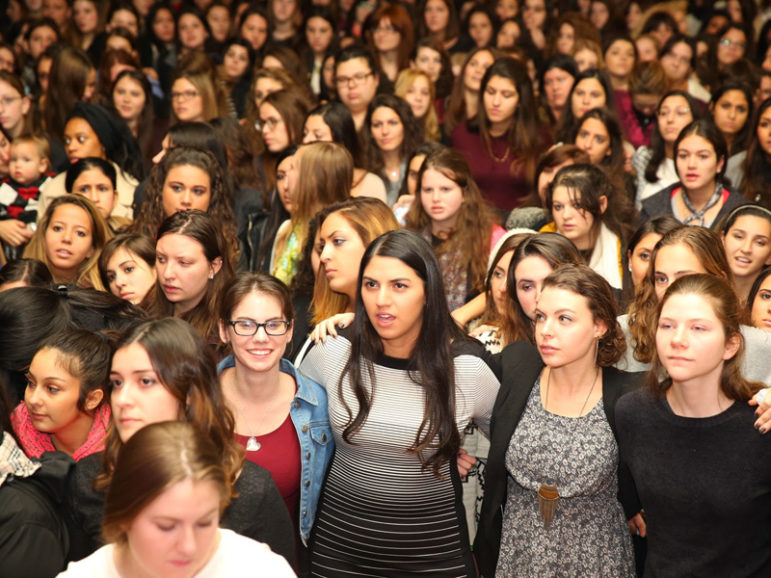(RNS) One of the most prominent Hasidic movements, with outposts on nearly 200 U.S. college campuses, isn’t steering students toward its brand of Orthodoxy. But it is surprising researchers with the bonds alumni maintain with its rabbis and their wives, known as “rebbetzins,” years after graduating.
“There are women who call the rebbetzin every Friday afternoon to wish them ‘Good Shabbos,’” said Mark Rosen, an associate professor at Brandeis University and lead author of a new study of 2,400 Jewish graduates and their interactions with Chabad.
“It’s really about these personal relationships. It’s like your personal rabbi.”
Chabad, which has more than 3,500 centers in more than 85 countries, is known for encouraging less-observant Jews to incrementally engage with their religious identity. Critics say it’s an effort to make Jews more Orthodox, but Chabad adamantly contests that. The results of the new study, “Chabad on Campus,” sponsored by the conservative-leaning Hertog Foundation, bear out Chabad’s claim, according to Rosen.
Only 15 of the 2,400 respondents said they joined ranks and identify as Chabad. About 88 percent of those who visited Chabad at least once do not identify as Orthodox.
“The data would say that Chabad is telling the truth. That’s less than 1 percent,” Rosen says. “These are Chabad lists.”
The study, which Rosen co-authored with Steven Cohen, Arielle Levites, and Ezra Kopelowitz, was a risk for Chabad, which shared 34,260 alumni emails with researchers.
“The results were going to be published irrespective of how they made Chabad look,” Rosen said. A total of 4,253 recipients opened the survey, and after researchers had removed 461 who didn’t identify as Jewish, they were left with 2,400.
Among those 2,400, who range in age from 21 to 29 and who graduated in 2007 or later, 60 percent who had participated regularly in Chabad during college — including attending meals, services or social events, and broaching friendships with a campus rabbi or rebbetzin — had been in touch with the rabbi or rebbetzin in the past 12 months about a Jewish concern or about an important personal issue. That tendency was the biggest surprise to Rosen, a Modern Orthodox Jew, who has learned about Chabad at family celebrations.
He had expected to find higher rates of college-age women lighting Sabbath candles, a shift in belief in God and more Orthodox views on marriage and dating among those who participated in Chabad events. He found those, but he was also surprised to find that Chabad affected every one of 18 indicators of Jewish practice.
Pavel Khazanov, 30, came to UCLA “generally on the Jewish identity track” in 2004, and he first interacted with Chabad as a sophomore. Khazanov, who had immigrated to the U.S. from Russia in 1997, wasn’t observant at the time. But he occasionally stopped in to Chabad for dinner.
He credits his experiences at Chabad for his being Modern Orthodox today. He remains in touch with both the rabbi and rebbetzin at the UCLA Chabad. He also donates money on a monthly basis.
“Ideologically, I was never into the Chabad line of religion,” he said, explaining that he didn’t care for its mystical approach to faith.
And yet he speaks to the rabbi on the phone every few months, and he gets regular messages from him on Facebook.
“I am invested in the success of their enterprise,” he says. “I’m happy to help to the extent that I can.”
Although the study found that Chabad can greatly impact its alumni even years after graduation, it also found that some students moved in the opposite direction. “There were certainly some people who basically said, as my father would say, ‘Nisht (not) for me,’” Rosen says.
More than half of respondents either didn’t come to Chabad at all or came very infrequently. Some of those avoided Chabad because its views on gender, intermarriage or Israel didn’t reflect their own, while others preferred different Jewish campus organizations, according to Rosen.
“I grew up in Chicago. I went to the Cubs,” Rosen said.”I didn’t go to the White Sox.”
(Menachem Wecker is an RNS correspondent)





